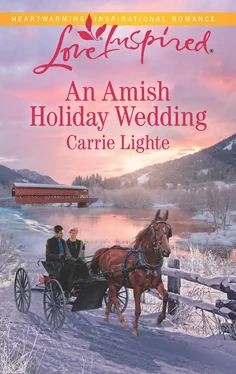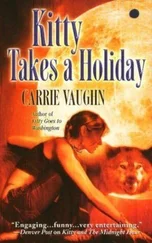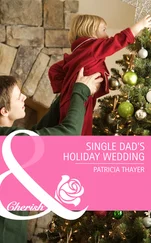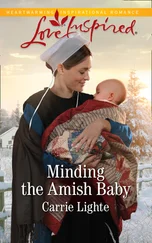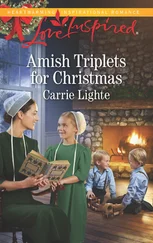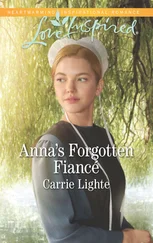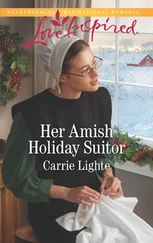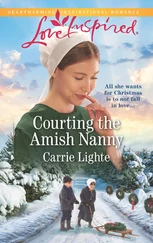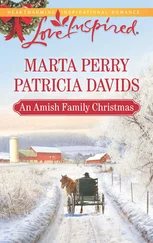“Guder mariye,” he greeted his mother when he returned, startled to see her out of bed. For years, her rheumatoid arthritis manifested itself in periods of extreme fatigue and sore, swollen joints, and ever since Hunter’s father died, her flare-ups were more frequent and intense. “You’re up early.”
“ Jah , and your Ant Ruth is awake, too,” his mother replied. “I’m fixing her something to eat. She was asking after you, since she was asleep when we arrived last night. Would you keep her company while I make breakfast?”
Hunter tentatively approached the parlor where his aunt was reclining on the sofa with her leg propped on a stool. Her skin was pale and she wore a white cast on her foot, as well as a sling on her arm, but her eyes were lively.
“There he is, my favorite nephew!” she squealed.
Despite his pain, Hunter chuckled at their old joke; he was Ruth’s only nephew. After giving her a careful embrace, he asked, “How are you feeling, Ant Ruth?”
“I’m madder than a wet hen!” she exclaimed. “You probably know better than anyone how frustrating it is to be confined to bed when you’re used to being out and about.”
Hunter clenched his jaw. “That I do.”
“But it’s worth it if it means I get to see you and your mamm’s faces again,” Ruth said, her voice softening. “I wish I could see your daed’s face again, too.”
Hunter shared the same wish. The last time he’d seen his father’s face was the evening of the accident, some fifteen months ago. They were returning home from work when a truck driver lost his brakes, sideswiped their buggy and rammed into the wall of an overpass, where he perished in the fiery crash. Hunter and his father were trapped beneath their mangled, overturned buggy, unable to help him or themselves.
“Hunter, if Gott spares your life, promise you’ll take gut care of your mamm ,” his father pleaded while he lay dying. After Hunter agreed, his father whispered, “Two of my greatest blessings in this lifetime were being a husband to your mamm and a daed to you. I couldn’t have asked the Lord for a better wife or suh .”
“Nor I for a better daed ,” Hunter echoed before passing out. By the time he was cognizant enough to speak again, Hunter learned he was in the hospital and his father had already been buried for three days.
Remembering, Hunter shuddered and shifted in his chair. To his relief, his aunt changed the subject.
“Mmm, that smells good. What is your mamm making for breakfast?”
“ Oier , I think,” Hunter guessed. Then he launched into a narrative of his roadside encounter with Faith.
“Ach!” Ruth exclaimed. “What a fiasco! You must collect oier from the henhouse and deliver them to Faith after breakfast. She’ll need them to fill her customers’ orders.”
“I’m the last person she wants to see again today,” Hunter protested.
More to the point, he didn’t want to see her again today. In fact, he didn’t wish to see—or to be seen—by anyone in Willow Creek just yet. The questions about his circumstances would come soon enough; he’d rather field them after he recovered from the tiresome journey.
“Nonsense! Take the buggy if you’d like, but it’s the right thing to do, even if Faith was at fault. She’ll be so glad to see you coming she might even treat you to one of her appenditlich cream-filled doughnuts. The trip will be worth your while.”
“Okay,” Hunter agreed. He knew better than to argue with his aunt once she’d made up her mind, but he’d made up his mind, too. He’d drop the eggs off, but he wasn’t going to hang around Faith’s bakery eating doughnuts, no matter how delicious Ruth claimed they were.
* * *
Of all days to have an egg mishap, Faith was dismayed it happened on a Saturday, the busiest day of the week and the same day she had a special order to fill. When she arrived at the bakery, she surveyed the glass display case, taking inventory.
The honey bars would stay moist through Monday. There were plenty of fresh whoopee pies and molasses cookies, but she’d have to move the cinnamon rolls to the day-old shelf. She had intended to start a few batches of her renowned cream-filled doughnuts before the bakery opened at seven, but now she wouldn’t have enough eggs. When her only employee, Pearl Hostetler, arrived, she’d ask her to whisk over to the mercantile, which didn’t open until eight thirty, to purchase more. Meanwhile, the egg shortage would put them behind schedule on all their baking for the day.
Faith sighed. First things first. She set about mixing yeast with hot water. Although she preferred baking more elaborate goodies, several of her Englisch customers depended on her for homemade bread. Every purchase counted if she was going to meet her financial goal by the first of the year, which was only a month and a half away.
That was the deadline the Englisch landlord required for the down payment on next year’s lease. In addition to the small storefront and kitchen, Faith would also rent the one-room apartment above the shop, since the current tenant was moving out. He was the third resident to leave in four years, and with each turnover, there had been a three-or four-month delay before a new resident moved in. Disgruntled by the gap in revenue, the landlord was adamant that from now on, the apartment and building space were to be a package deal. Faith either had to rent both or lose the bakery to Seth Helmuth, who wanted to set up a leather shop in the prime location downstairs and use the upstairs apartment for storage and supplies. But Faith had first dibs, and although the down payment amount was more than she had saved, she was arduously working to earn the total sum.
“Won’t you be lonely, living all by yourself?” Pearl asked when she discovered Faith would be moving into the apartment.
Living alone wasn’t something most Amish women voluntarily chose to do, and as someone who dearly missed her three children who moved out of state, Pearl couldn’t fathom why the opportunity might appeal to Faith.
“I won’t have time to be lonely,” Faith responded. “I’ll wake up and kumme right down here, where I’ll have the privilege of working with you and visiting our neighbors and serving our customers. I’ll spend the better part of Sundays and holidays with my family and with the church. The only difference is I won’t have to ride my brothers’ old hand-me-down tandem bicycle to get here each day.”
Faith’s sister-in-law Henrietta was even more dismayed about Faith’s decision.
“You can’t allow her to separate herself from the family like this,” she once told Faith’s oldest brother, Reuben.
“The Ordnung doesn’t forbid it, so neither do I,” Reuben replied. “Faith is a thoughtful person. I trust she prayed about this decision and is aware of the challenges.”
As the eldest son, Reuben became the head of the family when their daed died five years earlier, since their mamm had passed away five years before then. Reuben and Henrietta lived in the large Yoder farmhouse with their three young sons, Faith and four of her five other brothers. The fifth brother, Noah, lived with his wife, Lovina, and their children in a small adjoining daadi haus . Faith knew she’d always have a place and purpose within her family, but given how cramped their dwelling was, she couldn’t understand why Henrietta objected to her moving.
“If you live alone, you’ll appear uncooperative or proud. You’ve already got one significant reason a man wouldn’t wish to marry you—do you want to make it even more difficult to find a mate?” her sister-in-law asked her.
Читать дальше
